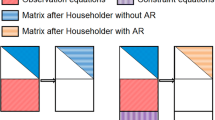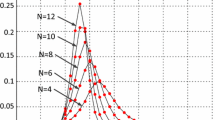Abstract
An important step in the high-precision GPS positioning is double-difference integer ambiguity resolution (IAR). The fraction or percentage of success among a number of integer ambiguity fixing is called the success rate. We investigate the ambiguity resolution success rate for the GPS observations for two cases, namely a nominal and a realistic stochastic model of the GPS observables. In principle, one would expect to have higher reliability on IAR success rates if a realistic GPS observables stochastic model is employed. The GPS geometry-based observation model is employed in which a more realistic stochastic model of GPS observables is determined using the least-squares variance component estimation. Two short and one GPS long baseline datasets and one simulated dataset are employed to evaluate the efficacy of the proposed algorithm. The results confirm that a more realistic stochastic model can significantly improve the IAR success rate on individual frequencies, either on L1 or on L2. An improvement of 25 % was achieved to the empirical success rate results. The results are of interest for many applications in which single-frequency observations can be used. This includes applications like attitude determination using single frequency single epoch of GPS observations.

Similar content being viewed by others
References
Amiri-Simkooei AR (2007) Least-squares variance component estimation: theory and GPS applications. Ph.D. thesis, Delft University of Technology, Delft, The Netherlands
Amiri-Simkooei AR (2009) Noise in multivariate GPS position time series. J Geod Berlin 83(2):175–187
Amiri-Simkooei AR (2013) Application of least squares variance component estimation to errors-in-variables models. J Geod Berlin 87:935–944
Amiri-Simkooei AR, Tiberius CCJM (2007) Assessing receiver noise using GPS short baseline time series. GPS Solut 11(1):21–35
Amiri-Simkooei AR, Tiberius CCJM, Teunissen PJG (2007) Assessment of noise in GPS coordinate time series: methodology and results. J Geophys Res 112(B07413)
Amiri-Simkooei AR, Teunissen PJG, Tiberius CCJM (2009) Application of least-squares variance component estimation to GPS observables. J Surv Eng 135(4):149–160
Amiri-Simkooei AR, Zangeneh-Nejad F, Asgari J (2013) Least-squares variance component estimation applied to GPS geometry-based observation model. J Surv Eng 139(4):176–187
Euler HJ, Goad C (1991) On optimal filtering of GPS dual frequency observations without using orbit information. Bull Geod 65:130–143
Hofmann-Wellenhof B, Lichtenegger H, Wasle E (2008) GNSS global navigation satellite systems—GPS, GLONASS, Galileo & more. Springer, New York
Jazaeri S, Amiri-Simkooei AR, Sharifi MA (2012) Fast integer least-squares estimation for GNSS high-dimensional ambiguity resolution using lattice theory. J Geod Berlin 86(2):123–136
Jazaeri S, Amiri-Simkooei AR, Sharifi MA (2013) Fast GNSS ambiguity resolution by ant colony optimization. Surv Rev 45:190–196
Jazaeri S, Amiri-Simkooei AR, Sharifi MA (2014a) On lattice reduction algorithms for solving weighted integer least-squares problems: comparative study. GPS Solut 18(1):105–114
Jazaeri S, Amiri-Simkooei AR, Sharifi MA (2014b) Modified weighted integer least squares estimation for GNSS integer ambiguity resolution. Surv Rev 46:112–121
Jonkman NF (1997) Integer GPS-ambiguity estimation without the receiver-satellite geometry. MGP-Series, No. 18, Delft University of Technology
Joosten P, Irsigler M (2003) GNSS ambiguity resolution in the presence of multipath. In the European navigation conference GNSS 2002, Graz, Austria
Joosten P, Pany T, Winkel J (2002) The impact of unmodelled multipath on ambiguity resolution. ION GPS 2002:953–961
Khodabandeh A, Amiri-Simkooei AR, Sharifi MA (2012) GPS position time-series analysis based on asymptotic normality of M-estimation. J Geod Berlin 86:15–33
Koch KR (1978) Schätzung von varianzkomponenten. Allgemeine Vermessungs-Nachrichten 85:264–269
Koch KR (1986) Maximum likelihood estimate of variance components. Boll Geod Sci Affini 60:329–338 (Ideas by A.J. Pope)
Koch KR (1999) Parameter estimation and hypothesis testing in linear models. Springer, Berlin
Kubo N, Yasuda A (2003) How multipath error influences on ambiguity resolution. In Proceedings of ION GNSS 2003, Portland
Rao CR (1971) Estimation of variance and covariance components—MINQUE theory. J Multivar Anal 1(3):257–275
Teunissen PJG (1988) Towards a least-squares framework for adjusting and testing of both functional and stochastic model. Internal research memo, Geodetic Computing Centre, Delft. A reprint of original 1988 report is also available in 2004, No. 26
Teunissen PJG (1993) Least squares estimation of the integer GPS ambiguities. Proc., IAG General Meeting, Series No. 6, Delft Geodetic Computing Centre
Teunissen PJG (1994) A new method for fast carrier phase ambiguity estimation. In: Proceedings of the IEEE PLANS’94, Las Vegas, NV, 11–15 April 1994, pp 562–573
Teunissen PJG (1995) The least-squares ambiguity decorrelation adjustment: a method for fast GPS integer ambiguity estimation. J Geod Berlin 70(1–2):65–83
Teunissen PJG (1997) A canonical theory for short GPS baselines, parts I–IV. J Geod Berlin 71:320–336, 389–401, 486–501, 513–525
Teunissen PJG (1998) Success probability of integer GPS ambiguity rounding and bootstrapping. J Geod Berlin 72:606–612
Teunissen PJG (1999) An optimality property of the integer least squares estimator. J Geod Berlin 73(11):587–593
Teunissen PJG (2000a) ADOP based upperbounds for the bootstrapped and the least-squares ambiguity success rates. Artif Satell 35(4):171–179
Teunissen PJG (2000b) Adjustment theory: an introduction. VSSD: series on mathematical Geodesy and positioning. Delft University Press, Delft
Teunissen PJG (2013) GNSS integer ambiguity validation: overview of theory and methods. In: Proceedings of the ION 2013 Pacific PNT Meeting, Honolulu, Hawaii, April 2013, pp 673–684
Teunissen PJG, Amiri-Simkooei AR (2008) Least-squares variance component estimation. J Geod Berlin 82(2):65–82
Teunissen PJG, Jonkman NF, Tiberius CCJM (1998) Weighting GPS dual frequency observations: bearing the cross of cross-correlation. GPS Solutions 2(2):28–37
Tiberius CCJM, Kenselaar F (2003) Variance component estimation and precise GPS positioning: case study. J Surv Eng 129(1):11–18
Verhagen S (2005) On the reliability of integer ambiguity resolution. Navigation 52(2):99–110
Verhagen S, Odijk D, Boon F, López-Almansa J (2007) Reliable multi-carrier ambiguity resolution in the presence of multipath. In: ION GNSS 2007, pp 339–350, Forth Worth, TX
Wang J, Satirapod C, Rizos C (2002) Stochastic assessment of GPS carrier phase measurements for precise static relative positioning. J Geod Berlin 76(2):95–104
Acknowledgments
We would like to acknowledge constructive comments of the editor and two anonymous reviewers, which improved the presentation and quality of this paper.
Author information
Authors and Affiliations
Corresponding author
Rights and permissions
About this article
Cite this article
Amiri-Simkooei, A.R., Jazaeri, S., Zangeneh-Nejad, F. et al. Role of stochastic model on GPS integer ambiguity resolution success rate. GPS Solut 20, 51–61 (2016). https://doi.org/10.1007/s10291-015-0445-5
Received:
Accepted:
Published:
Issue Date:
DOI: https://doi.org/10.1007/s10291-015-0445-5




